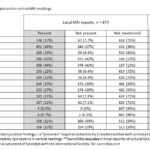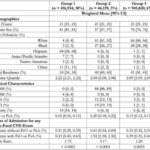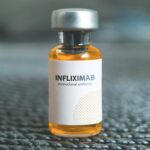Yalamanchili et al. describe how trends in disease-modifying anti-rheumatic drug (DMARD) use have evolved for insured, U.S. patients with juvenile idiopathic arthritis. Overall, the study found that from 2000 to 2022 in this patient population the use of biologic and targeted synthetic DMARDs rose, while the use of conventional synthetic DMARDs declined.
Articles by Arthritis & Rheumatology
Metabolic Syndrome & RA Treatment Response
Research from Baker et al. demonstrated a strong association between the presence of metabolic syndrome and lower response rates to advanced therapies in patients with RA.
Can MRI Predict Osteoarthritis’ Progression?
In individuals without radiographic knee osteoarthritis (OA), Chang et al. investigated whether magnetic resonance imaging (MRI) defined knee OA at baseline was associated with incident radiographic and symptomatic disease during up to 11 years of follow-up. The researchers found the two current MRI definitions of knee OA may not adequately predict the development of radiographic and symptomatic disease.
Chronic Back Pain & axSpA
Maksymowych et al. assessed the frequency of axial spondyloarthritis (axSpA) according to extra-articular presentation and human leukocyte antigen B27 (HLA-B27) status and sought to identify features that distinguish patients with axSpA from those with non-specific back pain. Their data support recommendations that patients with chronic back pain and extra-articular features related to axSpA be screened for axSpA with MRI and referred to a rheumatologist.

Are Sacroiliac Joint MRIs Accurate in Routine Clinical Practice?
Hadsbjerg et al. compared assessments of sacroiliac joint MRIs in local MRI reports from routine care in five European countries with re-reads by central experts in patients with a diagnosis of axial spondyloarthritis (axSpA) or psoriatic arthritis (PsA) to estimate the extent of over- or under-reporting of features and misclassification.
Lung Cancer in RA & RA-ILD
Brooks et al. evaluated the risk of lung cancer in patients with rheumatoid arthritis (RA) and RA-associated interstitial lung disease (ILD) compared with the risk in matched controls without RA or RA-ILD. Understanding whether RA predisposes someone to lung cancer and whether patients with RA-ILD represent a uniquely high-risk group could inform cancer-screening strategies.

Young Adults with Psoriatic Disease at Risk of Early Cardiovascular Disease
Background/Purpose Psoriasis and psoriatic arthritis (PsA) are closely linked inflammatory conditions that can affect both children and adults. In children, these diseases are associated with traditional cardiovascular disease risk factors and subclinical atherosclerosis. In older adults, systemic inflammation from psoriasis and PsA accelerates atherosclerosis, and these conditions are independent risk factors for severe cardiovascular disease…

Autoantibodies Illuminate Lupus Nephritis
Fava et al. investigated longitudinal autoantibody profiles in patients with lupus nephritis (LN) to define serological biomarkers of histologic class. They found that baseline levels of anti-C1q and anti-double-stranded DNA antibodies may serve as noninvasive biomarkers of proliferative LN and anti-C1q antibodies may predict complete response.

Anti-Infliximab Antibodies Predict Response in Axial Spondyloarthritis
Pimentel et al. evaluated the influence of anti-infliximab antibodies on patients with axial spondyloarthritis. The researchers found that anti-infliximab antibodies were associated with decreased infliximab performance and difficulty tapering its dosage, as well as a good clinical response to a second, alternate tumor necrosis factor inhibitor.
Glucocorticoids Increase Infections, Mortality
Figueroa-Parra et al. set out to evaluate the effect of glucocorticoid regimens on renal response, infections and mortality rates among patients with lupus nephritis (LN). The researchers analyzed the control arms of randomized clinical trials and found a higher exposure to glucocorticoids during the initial treatment of LN was associated with better renal outcomes, at the cost of increased infections and mortality.
- 1
- 2
- 3
- …
- 11
- Next Page »